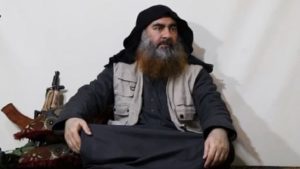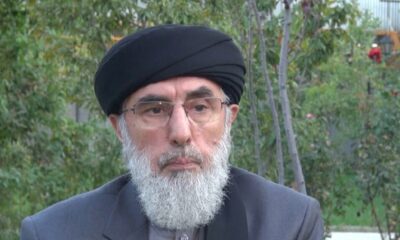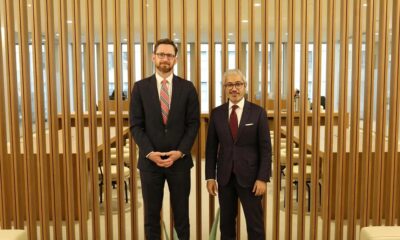Latest News
ISIS Leader Abu Bakr Al-Baghdadi Killed By U.S. Forces
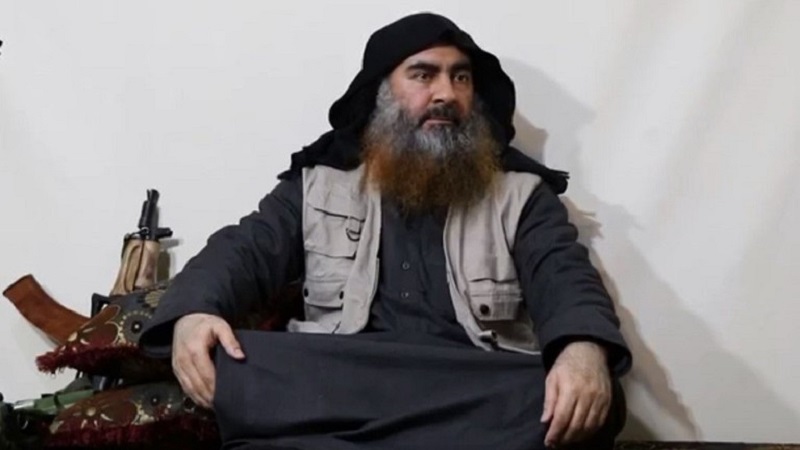
Abu Bakr Al-Baghdadi, the leader of the Islamic State (IS) group was killed in an operation by U.S. forces in Syria, U.S. media reported.
A U.S. official told The Associated Press late Saturday that al-Baghdadi was targeted in Syria’s northwestern Idlib province. The official said confirmation that the IS chief was killed in an explosion is pending. No other details were available. The official was not authorized to discuss the strike and spoke on condition of anonymity.
Meanwhile, sources have told CNN that Al-Baghdadi is believed to have detonated a suicide vest during the raid.
U.S. President Donald Trump has shared a puzzling tweet saying, “Something very big just happened!”
The White House said that Trump would be making a “major statement” on Sunday in this regard.
The Syrian Observatory for Human Rights, a Syria war monitor, reported an attack carried out by a squadron of eight helicopters accompanied by a warplane belonging to the international coalition on positions of the Hurras al-Deen, an al-Qaida-linked group, in the Barisha area north of Idlib city, after midnight on Saturday. IS operatives are believed to be hiding in the area, it said.
It said the helicopters targeted IS positions with heavy strikes for about 120 minutes, during which jihadists fired at the aircraft with heavy weapons. The Britain-based Observatory, which operates through a network of activists on the ground, documented the death of 9 people as a result of the coalition helicopter attack. It is not yet known whether al-Baghdadi is one of them, it said, adding that the death toll is likely to rise due to a large number of wounded.
Al-Baghdadi’s presence in the village, which is a few kilometers away from the Turkish border, would come as a surprise, even if some IS leaders are believed to have fled to Idlib after losing their last territories in Syria to U.S.-allied Kurdish forces in March. The surrounding areas are largely controlled by a rival of the Islamic State group — the al-Qaida-linked Hayat Tahrir al-Sham, or HTS — although other jihadi groups sympathetic to IS operate there. Unverified video circulated online by Syrian groups appeared to support the Observatory claim that the operation occurred in Barisha.
Al-Baghdadi has led IS for the last five years, presiding over its ascendancy as it cultivated a reputation for beheadings and attracted hundreds of thousands of followers to a sprawling and self-styled caliphate in Iraq and Syria. He remained among the few IS commanders still at large despite multiple claims in recent years about his death and even as his so-called caliphate dramatically shrank, with many supporters who joined the cause either imprisoned or jailed.
His exhortations were instrumental in inspiring terrorist attacks in the heart of Europe and in the United States. Shifting away from the airline hijackings and other mass-casualty attacks that came to define al-Qaida, al-Baghdadi and other IS leaders supported smaller-scale acts of violence that would be harder for law enforcement to prepare for and prevent.
They encouraged jihadists who could not travel to the caliphate to kill where they were, with whatever weapon they had at their disposal. In the U.S., multiple extremists have pledged their allegiance to al-Baghdadi on social media, including a woman who along with her husband committed a 2015 massacre at a holiday party in San Bernardino, California.
With a $25 million U.S. bounty on his head, al-Baghdadi has been far less visible in recent years, releasing only sporadic audio recordings, including one just last month in which he called on members of the extremist group to do all they could to free IS detainees and women held in jails and camps.
The purported audio was his first public statement since last April when he appeared in a video for the first time in five years.
In 2014, he was a black-robed figure delivering a sermon from the pulpit of Mosul’s Great Mosque of al-Nuri, his only known public appearance. He urged Muslims around the world to swear allegiance to the caliphate and obey him as its leader.
“It is a burden to accept this responsibility to be in charge of you,” he said in the video. “I am not better than you or more virtuous than you. If you see me on the right path, help me. If you see me on the wrong path, advise me and halt me. And obey me as far as I obey God.”
Though at minimum a symbolic victory for Western counterterrorism efforts, his death would have an unknown practical impact on possible future attacks. He had been largely regarded as a symbolic figurehead of the global terror network and was described as “irrelevant for a long time” by a coalition spokesman in 2017.
Al-Baghdadi was born Ibrahim Awwad Ibrahim Ali al-Badri al-Samarrai in 1971 in Samarra, Iraq, and adopted his nom de guerre early on. Because of anti-U.S. militant activity, he was detained by U.S. forces in Iraq and sent to Bucca prison in February 2004, according to IS-affiliated websites.
He was released 10 months later, after which he joined the al-Qaida branch in Iraq of Abu Musab al-Zarqawi. He later assumed control of the group, known at the time as the Islamic State of Iraq.
After Syria’s civil war erupted in 2011, al-Baghdadi set about pursuing a plan for a medieval-style Islamic State, or caliphate. He merged a group known as the Nusra Front, which initially welcomed moderate Sunni rebels who were part of the uprising against Syrian President Bashar Assad, with a new one known as the Islamic State of Iraq and the Levant. Al-Qaida’s central leadership refused to accept the takeover and broke with al-Baghdadi.
Al-Baghdadi’s fighters captured a contiguous stretch of territory across Iraq and Syria, including key cities, and on June 2014, it announced its own state — or caliphate. Al-Baghdadi became the declared caliph of the newly renamed Islamic State group. Under his leadership, the group became known for macabre massacres and beheadings —often posted online on militant websites — and strict adherence to an extreme interpretation of Islamic law.
Over the years, he has been reported multiple times to have been killed, but none has been confirmed. In 2017, Russian officials said there was a “high probability” he had been killed in a Russian airstrike on the outskirts of Raqqa, but U.S. officials later said they believed he was still alive.

Latest News
Media Violation Commission bans two TV channels

The Media Violations Commission has ordered Noor and Barya TV channels to stop broadcasting and to appear in court, state-run Bakhtar News Agency reported on Tuesday.
ّIt is said that the decision against the channels was taken for “not observing the principles of journalism.”
Latest News
Hekmatyar slams US for ‘occupying’ Afghanistan’s airspace
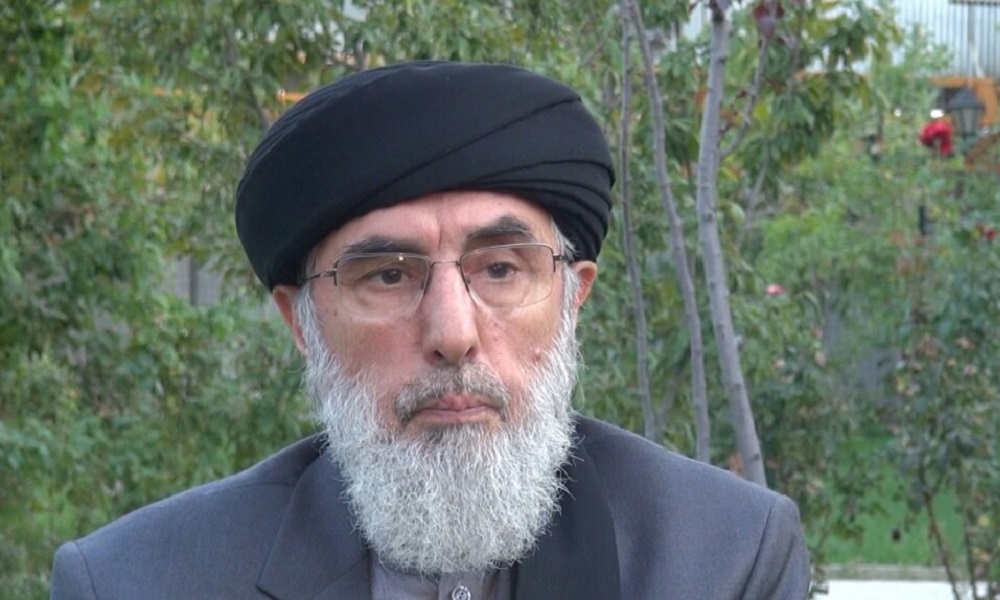
Former Jihadi leader Gulbuddin Hekmatyar has criticized the United States for patrolling Afghanistan’s airspace with drones.
Hekmatyar said in a speech Tuesday that any form of American presence in Afghanistan is unacceptable.
“Afghanistan’s airspace is under occupation. Expressing this issue is our religious responsibility. We have sacrificed the most for freedom. We do not accept any presence of America. We do not accept any kind of foreign rule,” he said.
Hekmatyar also stated that there is a possibility of American troops entering the country again.
“[Former] President Trump’s national security advisor says that their departure was a mistake and that they should return. This is not an ordinary issue. The possibility that they will make a mistake again and return to Afghanistan is very strong,” he said.
The Islamic Emirate has not commented so far on Hekmatyar’s remarks, but it has confirmed sightings of drones over Afghanistan.
“It is required that the respected officials of the caretaker government give explanations on this matter and respond to the concerns of the Afghan people in this matter, because important and great national issues are important for every Afghan citizen and if there is a problem, it will be a cause of concern for everyone,” said Fazl-ul-Hadi Wazin, a university lecturer.
Latest News
Uzbek and Qatari leaders discuss Trans-Afghan Railway project
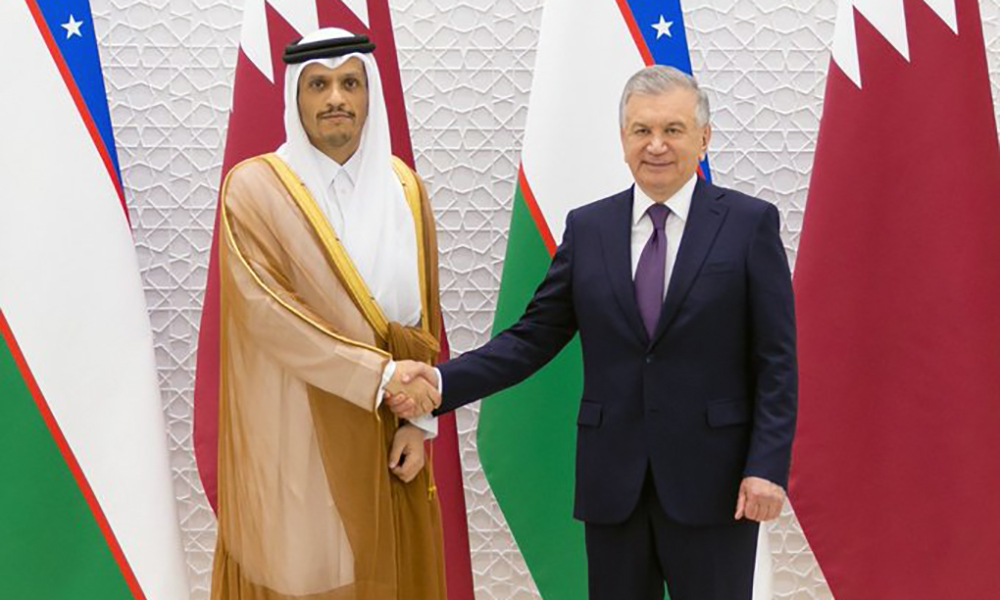
Uzbekistan’s President Shavkat Mirziyoyev on Monday met with Qatar’s Prime Minister and Foreign Minister Sheikh Mohammed bin Abdulrahman Al Thani for talks on a number of issues including the Trans-Afghan Railway project.
The two leaders also discussed bilateral trade issues, strengthening of relations and regional matters, including the escalating situation in the Middle East.
In October 2023, Uzbekistan Railways JSC presented the Trans-Afghan Railway project to Qatar’s Ministry of Transport.
Subsequently, deliberations were held on Qatar’s involvement in the project’s execution.
In February 2021, Uzbekistan, Afghanistan, and Pakistan signed a roadmap for the Termez-Mazar-i-Sharif-Kabul-Peshawar railway construction.
The envisioned transport corridor, estimated at approximately $5 billion, aims to connect Europe, Russia, Uzbekistan, Afghanistan, Pakistan, India, and Southeast Asian nations, boasting a transit capacity of up to 20 million tons of cargo.
-
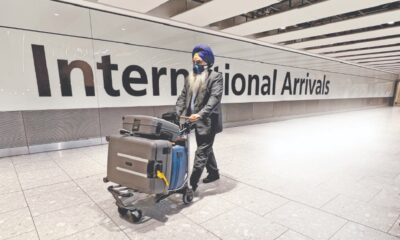
 Regional4 days ago
Regional4 days agoIndian foreign ministry advises against travel to Iran, Israel
-
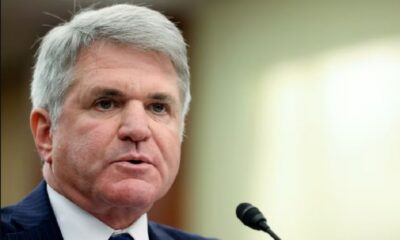
 Latest News5 days ago
Latest News5 days agoAfghanistan withdrawal probe sparks anxiety within Biden administration: US’s McCaul
-

 Latest News4 days ago
Latest News4 days agoLightning strikes in Helmand kill one, injure three
-
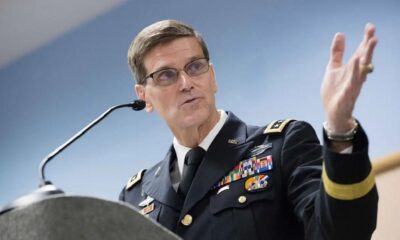
 Latest News4 days ago
Latest News4 days agoTop former US general claims Daesh-Khorasan is ‘on the upswing’
-

 Science & Technology4 days ago
Science & Technology4 days agoChina launch of relay satellite Queqiao-2 for lunar probe mission successful
-
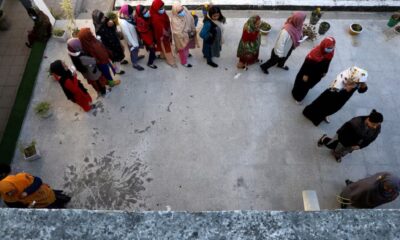
 World5 days ago
World5 days agoVoters in many countries sceptical of democracy, poll shows
-

 Business3 days ago
Business3 days agoAfghanistan reaches self-sufficiency in production of 133 items: MoIC
-

 Health3 days ago
Health3 days agoMajority of Afghans with mental disorders are women: officials

